26 Mar 2019 | Magazine, Magazine Editions, Volume 48.01 Spring 2019
[vc_row][vc_column][vc_custom_heading text=”With contributions from Richard Littlejohn, Libby Purves, Michal Hvorecký, Karoline Kan, Andrew Morton, Jeffrey Wasserstrom, Rituparna Chatterjee and Julie Posetti”][/vc_column][/vc_row][vc_row][vc_column][vc_column_text]
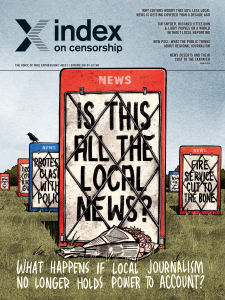
Is this all the local news? The spring 2019 issue of Index on Censorship magazine.
The spring 2019 edition of Index on Censorship looks at local news in the UK and around the world and what happens when local journalism no longer holds power to account.
Our exclusive survey of editors and journalists in the UK shows that 97% are worried that local newspapers don’t have the resources any more to hold power to account. Meanwhile the older population tell us they are worried that the public is less well informed than it used to be. Local news reporting is in trouble all over the world. In the USA Jan Fox looks at the news deserts phenomenon and what it means for a local area to lose its newspaper. Karoline Kan writes from China about how local newspapers, which used to have the freedom to cover crises and hold the government to account, are closing as they come increasingly under Communist Party scrutiny. Veteran English radio journalist Libby Purves tells editor Rachael Jolley that local newspapers in the UK used to give a voice to working-class people and that their demise may have contributed to Brexit. In India Rituparna Chatterjee finds a huge appetite for local news, but discovers, with some notable exceptions, that there is not enough investment to satisfy demand. “Fake news” is on the rise, and journalists are vulnerable to bribery. Meanwhile Mark Frary examines how artificial intelligence is being used to write news stories and asks whether this is helping or hindering journalism. Finally an extract from the dystopian Slovak novel Troll, Michal Hvorecký published in English for the first time imagines an outpouring of state-sponsored hate
[/vc_column_text][/vc_column][/vc_row][vc_row][vc_column][vc_custom_heading text=”Special Report: Is this all the local news?”][/vc_column][/vc_row][vc_row][vc_column][vc_column_text]
The future is robotic by Mark Frary Would journalists have more time to investigate news stories if robots did the easy bits?
Terrorising the truth by Stephen Woodman Journalists on the US border are too intimidated by drug cartels to report what is happening
Switched off by Irene Caselli After years as a political football, Argentinian papers are closing as people turn to the internet for news
News loses by Jan Fox Thousands of US communities have lost their daily papers. What is the cost to their area?
Stripsearch by Martin Rowson On the death of local news
What happens when our local news disappears by Tracey Bagshaw How UK local newspapers are closing and coverage of court proceedings is not happening
Who will do the difficult stories now? by Rachael Jolley British local newspaper editors fear a future where powerful figures are not held to account, plus a poll of public opinion on journalism
“People feel too small to be heard” by Rachael Jolley Columnist Libby Purves tells Index fewer working-class voices are being heard and wonders whether this contributed to Brexit
Fighting for funding by Peter Sands UK newspaper editors talk about the pressures on local newspapers in Britain today
Staying alive by Laura Silvia Battaglia Reporter Sandro Ruotolo reveals how local news reporters in southern Italy are threatened by the Mafia
Dearth of news by Karoline Kan Some local newspapers in China no longer dig into corruption or give a voice to local people as Communist Party scrutiny increases
Remote controller by Dan Nolan What happens when all major media, state and private, is controlled by Hungary’s government and all the front pages start looking the same
Rocky times by Monica O’Shea Local Australian newspapers are merging, closing and losing circulation which leaves scandals unreported
[/vc_column_text][/vc_column][/vc_row][vc_row][vc_column][vc_custom_heading text=”Global View”][vc_column_text]
[/vc_column_text][/vc_column][/vc_row][vc_row][vc_column][vc_custom_heading text=”In Focus”][vc_column_text]
Turning off the searchlights by Alessio Perrone The Italian government attempts to restrict coverage of the plight of refugees crossing the Mediterranean
Standing up for freedom Adam Reichardt A look at Gdańsk’s history of protest and liberalism, as the city fights back after the murder of mayor Paweł Adamowicz
After the purge by Samuel Abrahám and Miriam Sherwood This feature asks two writers about lessons for today from their Slovak families’ experiences 50 years ago
Fakebusters strike back by Raymond Joseph How to spot deep fakes, the manipulated videos that are the newest form of “fake news” to hit the internet
Cover up by Charlotte Bailey Kuwaiti writer Layla AlAmmar discusses why 4,000 books were banned in her home country and the possible fate of her first #MeToo novel
Silence speaks volumes by Neema Komba Tanzanian artists and musicians are facing government censorship in a country where 64 new restrictions have just been introduced
[/vc_column_text][/vc_column][/vc_row][vc_row][vc_column][vc_custom_heading text=”Culture”][vc_column_text]
The year of the troll by Michal Hvorecký This extract from the novel Troll describes a world where the government controls the people by spewing out hate 24 hours a day
Ghost writers by Jeffrey Wasserstrom The author and China expert imagines a fictional futuristic lecture he’s going to give in 2049, the centenary of Orwell’s Nineteen Eighty-Four
Protesting through poetry by Radu Vancu Verses by one of Romania’s most renowned poets draw on his experience of anti-corruption protests in Sibiu
[/vc_column_text][/vc_column][/vc_row][vc_row][vc_column][vc_custom_heading text=”Column”][vc_column_text]
[/vc_column_text][/vc_column][/vc_row][vc_row][vc_column][vc_custom_heading text=”Endnote”][vc_column_text]
Press freedom: EU blind spot? By Sally Gimson Many European countries are violating freedom of the press; why is the EU not taking it more seriously?
[/vc_column_text][/vc_column][/vc_row][vc_row][vc_column width=”1/3″][vc_custom_heading text=”Subscribe”][vc_column_text]In print, online, in your mailbox, on your iPad.
Subscription options from £18 or just £1.49 in the App Store for a digital issue.
Every subscriber helps support Index on Censorship’s projects around the world.
 SUBSCRIBE NOW[/vc_column_text][/vc_column][vc_column width=”1/3″][vc_single_image image=”105481″ img_size=”medium”][/vc_column][vc_column width=”1/3″][vc_custom_heading text=”Listen”][vc_column_text]The spring 2019 magazine podcast, featuring interviews with editor of chinadialogue, Karoline Kan; director of the Society of Editors in the UK Ian Murray and co-founder of the Bishop’s Stortford Independent, Sinead Corr. Index youth board members Arpitha Desai and Melissa Zisingwe also talk about local journalism in India and Zimbabwe
SUBSCRIBE NOW[/vc_column_text][/vc_column][vc_column width=”1/3″][vc_single_image image=”105481″ img_size=”medium”][/vc_column][vc_column width=”1/3″][vc_custom_heading text=”Listen”][vc_column_text]The spring 2019 magazine podcast, featuring interviews with editor of chinadialogue, Karoline Kan; director of the Society of Editors in the UK Ian Murray and co-founder of the Bishop’s Stortford Independent, Sinead Corr. Index youth board members Arpitha Desai and Melissa Zisingwe also talk about local journalism in India and Zimbabwe
LISTEN HERE[/vc_column_text][/vc_column][/vc_row]
12 Nov 2018 | Europe and Central Asia, Media Freedom, News
[vc_row][vc_column][vc_column_text]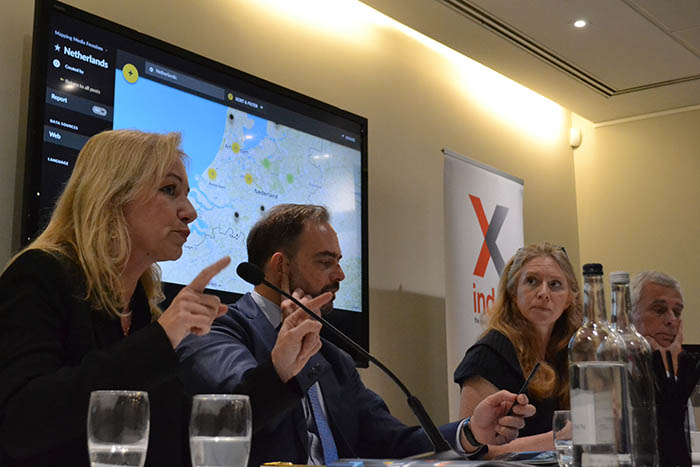
“Today journalism has become one of the most dangerous professions in the world,” said Frane Maroevic, director of the Office of the OSCE Representative on Freedom of the Media, at a panel discussion for the launch of Demonising the media: Threats to journalists in Europe at the Foreign Press Association in London on Friday 9 November.
The report surveys over 3,000 verified media freedom incidents in EU member states, candidates and potential candidates for entry as reported to Mapping Media Freedom, a project, funded by the European Commission, to investigate the full spectrum of threats to media freedom. It details how journalists face an array of threats from being burned in effigy, insulted and spat at, to being assaulted, sued and sent death and rape threats, since May 2014.
Also speaking on the panel were Deborah Bonetti, director of the Foreign Press Association, and Henrik Kaufholz, chair of the European Centre for Press and Media Freedom. The panel was chaired by Index on Censorship CEO Jodie Ginsberg.

“These threats are not far away. They are right here on our doorsteps, even in the UK,” said Ginsberg. Maroevic added: “We must put pressure on governments so that these threats and attacks don’t fade into obscurity.”
“What was traditionally a safe place for journalists, or what was perceived to be safe, is no longer as safe as we thought it was, and this goes for most western democracies,” said Bonetti. “I don’t think the journalist community has come to a Me Too movement yet.”
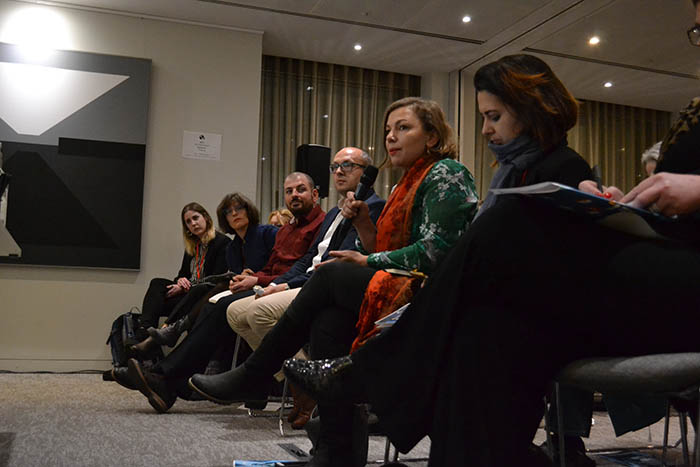
“If politicians think they will get votes by attacking the press, they will continue to attack the press,” said Kaufholz.
The report flags 19 deaths. Of the 445 verified physical assaults, Italy was the EU member state with the most (83), followed by Spain (38), France (36) and Germany (25). There were 437 verified incidents of arrest or detention and 697 verified incidents of intimidation. Among the member states, Italy’s journalists were intimidated most often, with 133 reports.
Paula Kennedy, assistant editor of MMF, said: “Mapping Media Freedom highlights the many dangers and problems faced by journalists in Europe as they try to do their job of holding power to account.”
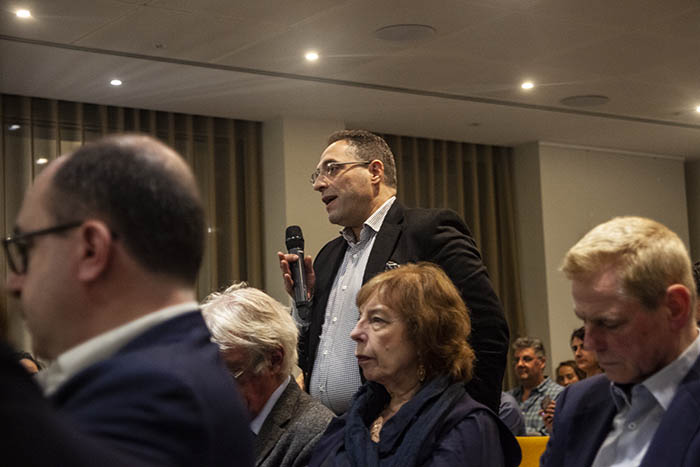
Photographs by Leah Asmelash, Rosie Gilby and Joy Hyvarinen. Additional reporting by Leah Asmelash[/vc_column_text][/vc_column][/vc_row][vc_row][vc_column][vc_media_grid grid_id=”vc_gid:1542043980941-e9bd3bc2-930e-5″ include=”103632,103633,103635,103631,103638,103639,103640,103641,103642,103643,103644,103645,103646,103647,103648,103649,103650,103651,103652,103653,103654″][/vc_column][/vc_row][vc_row][vc_column][vc_basic_grid post_type=”post” max_items=”4″ element_width=”6″ grid_id=”vc_gid:1542043980959-aaffae18-ba56-7″ taxonomies=”6564″][/vc_column][/vc_row]
22 Oct 2018 | Events
[vc_row][vc_column][vc_column_text]In the last month, the gruesome case of murdered Saudi journalist Jamal Khashoggi in Turkey hit global headlines and we marked one year since the murder of Maltese journalist Daphne Caruana Galizia. As the case for defending media workers grows more urgent, we invite you to join the conversation.
Join Index on Censorship at the Foreign Press Association alongside media representatives, policy makers and experts to debate the conclusions of a major report on Mapping Media Freedom. The report will be launched at the event with a panel discussion and opportunity for questions, followed by drinks.
Mapping Media Freedom
This project is co-funded by the European Commission and managed by Index on Censorship in partnership with the European Centre for Press and Media Freedom (ECPMF).
[/vc_column_text][vc_row_inner][vc_column_inner width=”1/4″][vc_single_image image=”103416″ img_size=”full” add_caption=”yes”][/vc_column_inner][vc_column_inner width=”1/4″][vc_single_image image=”103419″ img_size=”full” add_caption=”yes”][/vc_column_inner][vc_column_inner width=”1/4″][vc_single_image image=”103418″ img_size=”full” add_caption=”yes”][/vc_column_inner][vc_column_inner width=”1/4″][vc_single_image image=”103417″ img_size=”full” add_caption=”yes”][/vc_column_inner][/vc_row_inner][vc_column_text]
When: Friday 9th November, 5-7pm
Where: The Foreign Press Association, 8 St. James’ Square, London SW1Y 4JU
Tickets: This event is fully booked.
[/vc_column_text][/vc_column][/vc_row]
21 Sep 2018 | Albania, Europe and Central Asia, Mapping Media Freedom, Media Freedom, media freedom featured, News
[vc_row][vc_column][vc_column_text]
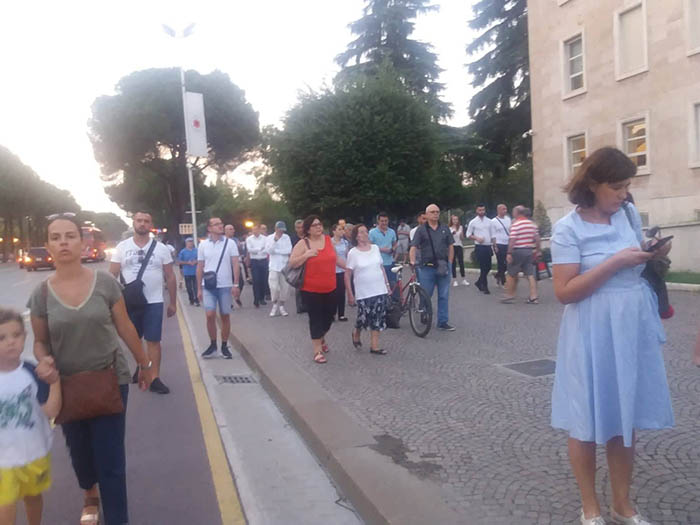
A small protest by journalists and citizens after the attack on Klodina Lala’s parental home. Credit: Fjori Sinoruka
In the early hours of 30 August, investigative journalist Klodiana Lala’s parental home was sprayed with bullets. Luckily no one was injured.
Lala, a crime reporter for Albania’s News 24 TV, connected the incident with her work as a journalist, saying that neither she nor her family had any personal conflicts that would spur this type of incident. The attack drew rapid condemnation and calls to bring the perpetrators to justice from concerned citizens and politicians, including the country’s prime minister, Edi Rama, who described it as a “barbarous” act. He pledged that the authorities would spare no efforts to investigate the attack.
Rama’s fine words about this attack belie the reality of most crimes against journalists in Albania: identification and prosecution rates of perpetrators are near zero.
When City News Albania’s editor Elvi Fundo was brutally assaulted at 11am in crowded central Tirana, he too received solidarity from the country’s politicians and press, including a note from Rama. But 17 months later, those expressions of support haven’t translated into action from prosecutors.
The attack on Fundo, in which he was beaten with iron bars by two men in hoodies just metres from his office, left him unconscious with serious injuries to his head and an eye.
To add insult to his injuries, Fundo was told on 31 August 2018 that prosecutors were suspending the investigation into his assault because of the lack of suspects.
“This is a grotesque decision. Investigations are not conducted thoroughly. I had to force authorities to seek out more footage from the bars around the area after I left the hospital. They didn’t seem very keen to do so,” he said.
Fundo’s lawyer challenged the decision in court, emphasising that he has given prosecutors information, he said, that can lead investigators to those that ordered the attack.
“I will never stop pushing them to bring the authors of the assault on me to justice since this is not a case lacking in information. I believe the police and prosecutors are just afraid of those who ordered the attack on me,” he said.
While intimidation is a criminal offence in Albania and is punishable by a fine or up to two years in prison, journalists find themselves without much support when they are threatened due to their professional duties.
Very often, prosecutors are reluctant to even open a case and when they do are eager to drop the charges, as was the case against a man who threatened a journalist on Facebook.
Dashamir Bicaku, a crime reporter who acted as a fixer and translator for a Daily Mail journalist, received an anonymous threatening message on June 17 2018 via his Facebook account. The threat came two days after the Mail published an investigation into Elidon Habilaj’s fraudulent asylum claim and subsequent career in British law enforcement, for which Habilaj was convicted and sentenced to 18 months in absentia.
“I’ll come straight to the point! I’ll come and get you so that there’ll be nothing left of you and yours!”, the message read. He reported the incident to the police the next day, alleging to law enforcement that Habilaj was the only person who would have a motive to threaten him.
But on 31 July 2018, he received a letter from the Vlora prosecutor’s office telling him that they had decided not to open an investigation into the case. According to Bicaku, the prosecutors said that Habilaj had denied sending a threatening message to the journalist and — even if he had — the message was not serious.
A few days later Bicaku learned that a close relative of Habilaj was working as a prosecutor in the same unit.
“What happened is a clear signal about the connections that those involved in organised crime have with people in the justice system,” Bicaku said.
Even when the aggressor has been clearly identified, negligence by the investigating institution makes appropriate punishment difficult.
Julian Shota, a correspondent of Report TV, was threatened with a gun by Llesh Butaku, the owner of a bar in the town of Lac where an explosion had taken place. When the journalist identified himself, Butaku demanded that he leave and not report the incident. When Shota refused, Butaku loaded a gun and pointed it at the journalist’s head.
Shota said he was saved by Butaku’s relatives, who grabbed his hand to prevent him from shooting. The journalist immediately reported the incident to police, but three hours passed before they arrived to detain Butaku.
“In three hours you can hide a rocket let alone a handgun,” Shota said. “The prosecutor received me in his office telling me clearly that I should not expect a lot since no gun was found on him.”
After seven hours Butaku released and the charge for illegal possession of firearms, which could have carried a prison sentence, was dropped.
“Instead of being investigated for attempted murder, Butaku is only being investigated for making threats,” he said.
Artan Hoxha, a prominent investigative journalist with over 20 years of experience, remembers tens of case when he was threatened because of his job, but that “every single case was suspended without any success”.
“I rarely report the threats that I receive to the authorities anymore. I know it is not worth even to bother doing so,” he said.
Part of the problem is that the Albanian judicial system is considered one of the most corrupt in Europe. It is currently undergoing a radical reform overseen by international experts in which all the country’s judges and prosecutors are being put through a vetting process.
As of August, 45 judges and prosecutors have been evaluated. Twenty-one failed and will be unable to continue to work in the judicial system.
Dorian Matlija, attorney and executive director at Res Publica, a centre for transparency, considers the prosecution the most problematic branch of the judicial system.
“Journalists are right, the prosecution is infamous for its bad work and it is one of the less scrutinised institutions over its decisions despite having a lot of power within the system,” he said.
According to Matlija, when journalists received death threats or are sued, they often find themselves alone.
“They have difficulties accessing and navigating the judicial system while the media owner is often the first to abandon them to keep trouble at bay,” Matlija said.
To remedy this, he said that is very important to create free legal help for journalists, not only when they face prosecution, and also to push for employment rights.
Journalists consider the lack of judicial protection a big obstacle in continuing doing investigative journalism in Albania.
“Is very difficult to investigate organised crime in Albania, since you don’t have the minimum protection and media owners can throw you out in the first place,” Bicaku said.[/vc_column_text][/vc_column][/vc_row][vc_row][vc_column][vc_basic_grid post_type=”post” max_items=”4″ element_width=”6″ grid_id=”vc_gid:1537456192915-fc339c8f-4676-3″ taxonomies=”6564″][/vc_column][/vc_row]

![]() SUBSCRIBE NOW[/vc_column_text][/vc_column][vc_column width=”1/3″][vc_single_image image=”105481″ img_size=”medium”][/vc_column][vc_column width=”1/3″][vc_custom_heading text=”Listen”][vc_column_text]The spring 2019 magazine podcast, featuring interviews with editor of chinadialogue, Karoline Kan; director of the Society of Editors in the UK Ian Murray and co-founder of the Bishop’s Stortford Independent, Sinead Corr. Index youth board members Arpitha Desai and Melissa Zisingwe also talk about local journalism in India and Zimbabwe
SUBSCRIBE NOW[/vc_column_text][/vc_column][vc_column width=”1/3″][vc_single_image image=”105481″ img_size=”medium”][/vc_column][vc_column width=”1/3″][vc_custom_heading text=”Listen”][vc_column_text]The spring 2019 magazine podcast, featuring interviews with editor of chinadialogue, Karoline Kan; director of the Society of Editors in the UK Ian Murray and co-founder of the Bishop’s Stortford Independent, Sinead Corr. Index youth board members Arpitha Desai and Melissa Zisingwe also talk about local journalism in India and Zimbabwe




